This is part one of a series in which we will be uploading the English translation of an interview with Emiko Okada, a survivor of the nuclear bombing of Hiroshima. Her whole story will be told in parts, detailing her early life before the war, her experience in the bombing and its aftermath, her life in the decades following the bombing, and her activism in recent years, in posts over the next few weeks. The interview was conducted in Japanese and has been translated so that her story can be spread around the world, to encourage people to think more deeply about peace and the role of nuclear weapons in the world today. The interview was spoken and has been translated as is, so read it as if somebody was talking to you.
Please click photos to open them bigger and have a closer look. Freshened up photos courtesy of Takeo Nakaoku.
The precious ‘normal’ days I spent in Onagachō
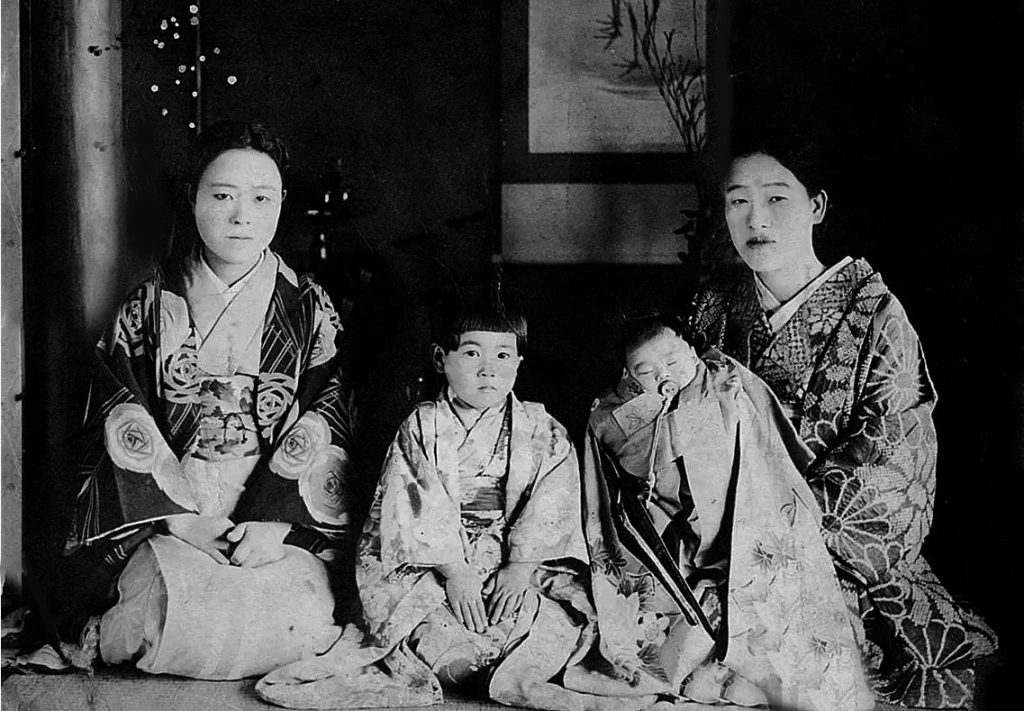
Emiko Okada (in her mother’s arms), with her older sister Mieko (middle) and her aunt, pictured on the left. (Photo taken 1937)
The birth of Emiko Okada (née Nakasako)
This is the first time I’ve told this old story like this. Though I am telling people about my experience in the nuclear bombing. It feels like I’m starting to get senile. Whilst I can still remember, I want to tell my story to those I meet. I’m starting to lose confidence in my memory.
I was brought up three doors down from where Setōuchi High School is now, in a place called Onagachō. I was called Nakasako. Emiko Nakasako. My birthday is the first of January, 1937.
My family was made up of my mum, my dad, my older sister, and my two younger brothers. So, I was one of four siblings.
In the blast most of the pictures of our house were lost, but the ones that were at my relatives houses were spared, and they sent them to me after the war. As always, I look like a boy in them with my bob cut that I had back then.
Even so, as there were girls in our house, like every family at the time who had girls, we had hina dolls (displayed on Girls’ day), because I had something like that around, I feel that I was really cared for. Every year they’d take it out of its box and set it up for me. This was around 1938.
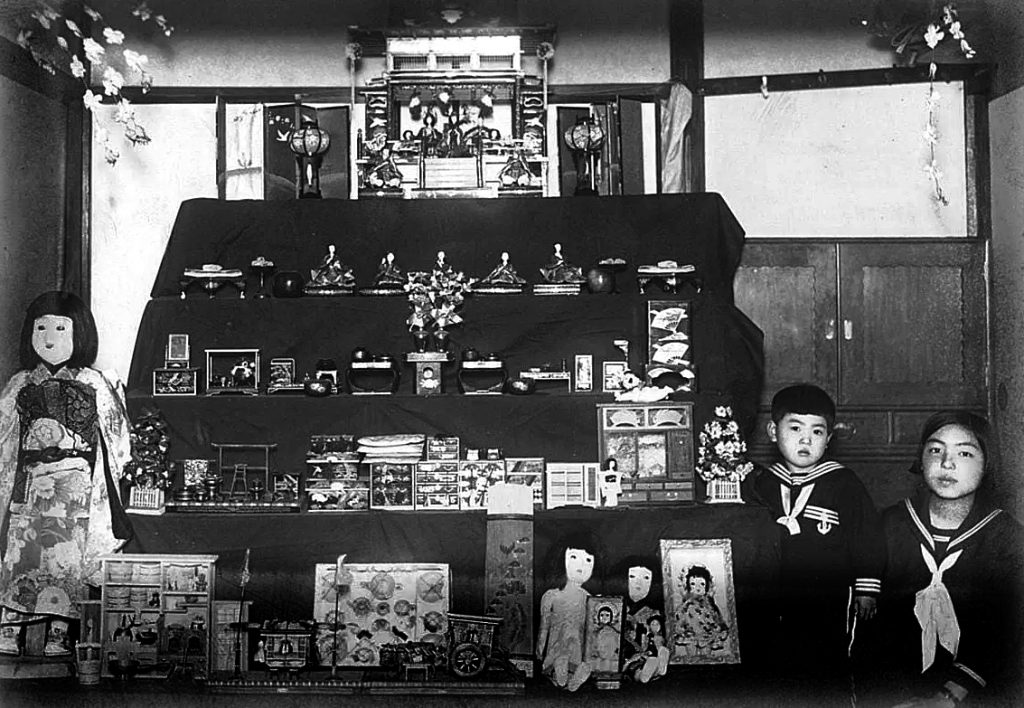
Okada-san pictured with her older sister Mieko and their hina doll display.
Just as I was due to begin primary school, I believe my mum was practicing buyo (a traditional type of Japanese dance). I have a photo in which my mum and sister were paying a sympathy visit to the army hospital. After the war, I remember them practicing the aoyanagi style of buyo on top of the Fukuya department store, which was left standing in the middle of the rubble. The Fukuya building was left standing. Although all around it was rubble and corpses. It was three or four stories tall. “How mysterious.” I thought.
There was an organ in our house. My sister played it for us. Even though it was in the middle of the war, it was really fun, a real good memory. Singing with my little brother. In the tense atmosphere of the time, we were only allowed to sing military songs like “The Seven Buttons”, but at home could sing happier children’s songs about quacking ducks and things. That was really fun. Thinking back, we were a really close family.
Admiring the Military
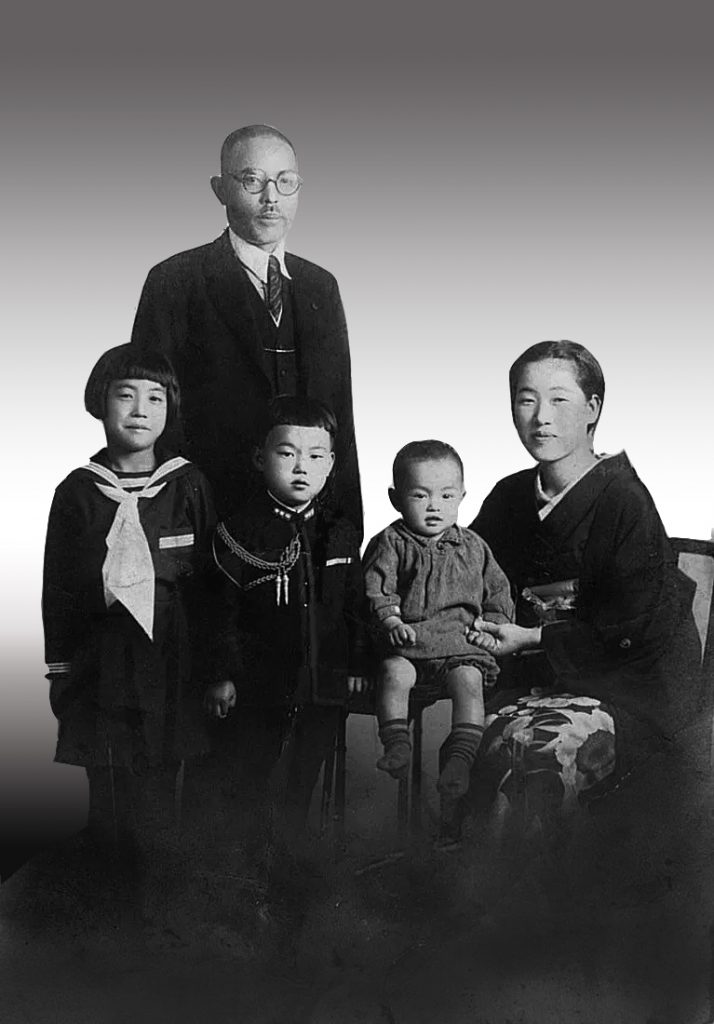
Okada-san as a child, pictured with her family. On the front left, her older sister Mieko, Okada-san in the middle in military-styled clothes with her boyish haircut, her little brother and her mother. Her father stands at the back.
I was a real tomboy. I even thought that I wanted to join the military. I’ve still got a photo of my younger self wearing a navy uniform (above). I really wanted to try military clothes on, I thought they were cool. We were educated to think that soldiers were the most fabulous people in the world. If you had a boy, every household would cooperate and send them off for the country, that’s just how it was at the time. Every single household.
In military education, there is no such thing as ‘freedom’. I remember getting my primary school textbooks, but from 1st through sixth grade, we had to line up at the school gates and bow as deeply as possible, chanting positive things about the emperor. We had to chant in extremely high-level, honorific language that no-one understood, so we had to memorise it and just repeat it without knowing what we were saying. Portraits of the emperor were hung at the gates of every school. Along with the statue of Ninomiya Kinjiro.
Around me, I remember middle school students being sent off to the front, though the red paper (draft card, calling young men up for military service) was only to come once one turned 17. Students my dad taught, those about to graduate, joined voluntarily. Everybody wanted to go to pilot school or navy school. Joining the military was just the done thing, it was how the atmosphere was at the time.
I was still a kid, so I just believed what I was taught. So, when the guys from my neighbourhood or my relatives were sent to the front, I saw them off happily. Waving a little flag, calling out “Banzai! Banzai! Banzai!” I have photos from when we celebrated my cousin being sent off (below). At the time, when the red paper came, everyone would send them off, prepared for the fact that they’d probably die in battle. They’d celebrate it.
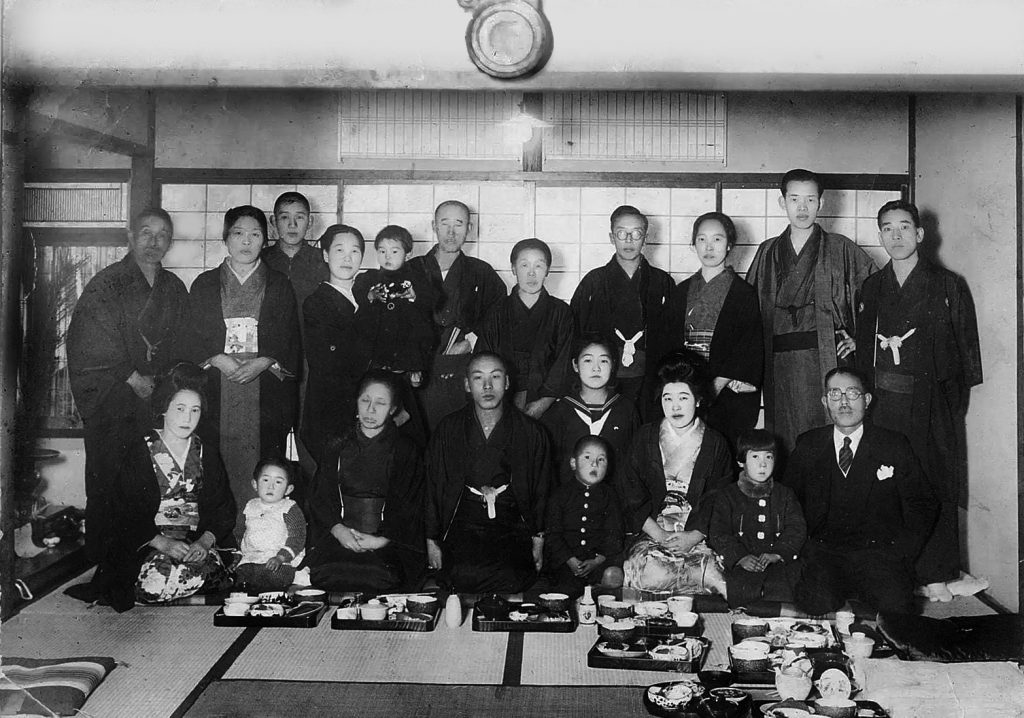
Okada-san and family sending off her cousin (seated in the front, in the middle) as he had been called up for action.
Life during the war
Every single household would say “For the country, For the country”. We’d have to take the gateposts and iron bars from our house and give them to the government, so they could make them into bullets. Even the brass from the window frames, anything like that.
Food gradually became more and more scarce, we didn’t even have rice to eat. It was a very trying time. It was a very hungry time for everyone. I remember, in the middle of that hunger, soldiers gave us sweets, it was like a dream, shiny and colourful – you pop one in your mouth and think “Wow, there are things that are this tasty!” Even now I still can’t forget that moment. The military had rice, sugar, I think they had everything.
Dad
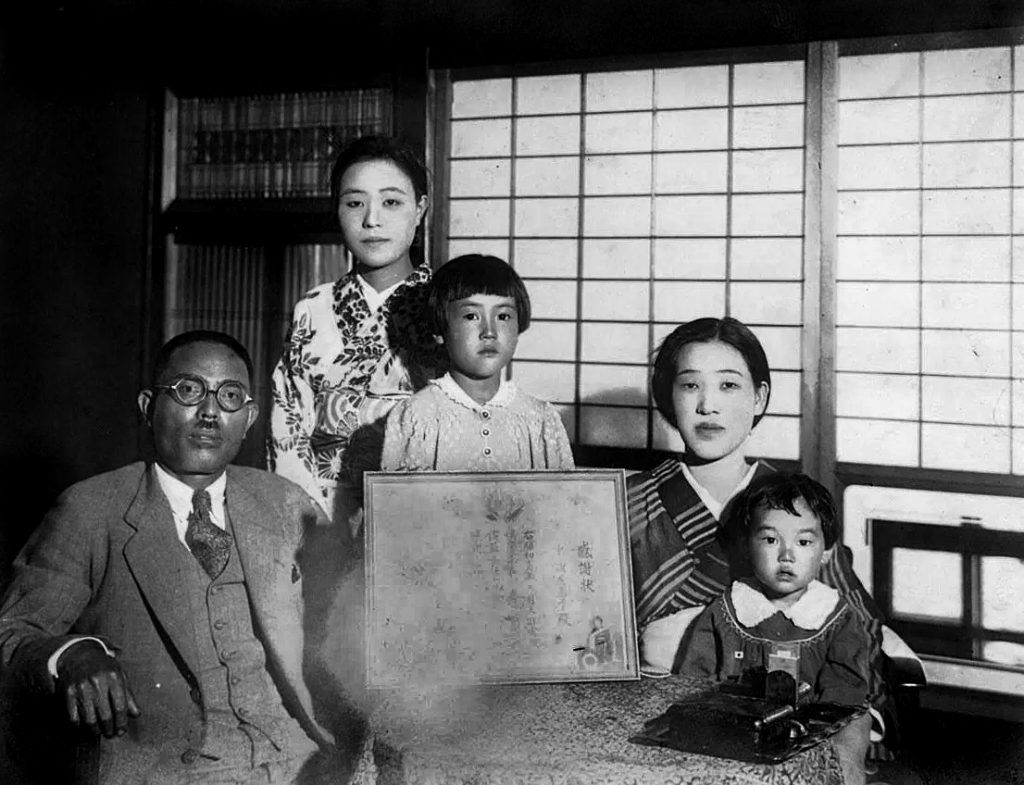
The Nakasako family circa 1939. Father on the left, aunt at the back, Mieko in the middle and Emiko on her mothers lap on the right.
My dad was a teacher at the current Setouchi High School, back then it was the Matsumoto Commercial School.
At home he was very loving. At the time, teachers were not just to be respected, they were seen as being above just about everyone – but at home was just regular old dad. He’d sit my little brother on his knee and eat together. He had a moustache, but he didn’t have a scary persona at all.
The reason he didn’t get called up for military service was that he was seen as necessary, to provide military education to middle schoolers. At Matsumoto School, there were a couple dozen soldiers. They were stationed at the Eastern Parade Grounds, but would sleep in the school buildings.
I have a recollection of going into the gym after hearing a trumpet being blown. Middle school students had to wear gaiters, khaki coloured clothes and soldiers caps or metal helmets. They didn’t have guns, but if they saw something move, they had to be ready and willing to kill, I believe that’s the way the military education worked at the time. Every single day. That’s why it was such a horrible time.
My dad was the eldest son of a farming family from East Hiroshima. They were really very poor. Before the war, everyone from his relatives to his siblings to his parents thought “The eldest has to take on the farm!”, he said “In these times we need to get an education.” This was before I was born, in the mid-1920s. It’s not like he was disowned, but no matter how many times he tried to explain his feelings to them they wouldn’t understand, so they agreed to let him go get an education on the condition that he come back to help with the farming on the weekends. So, he had the farm left to his younger brother. The Matsumoto that founded Matsumoto Commercial School was apparently a relative of mine. Dad got his teaching qualification on the job.
Apparently he said, “People from now on can’t simply stay as peasant farmers.” I heard from my aunt. After that, he bought the house three doors down from Matsumoto School in Onaga, he took my little sisters in and looked after them.
Mum
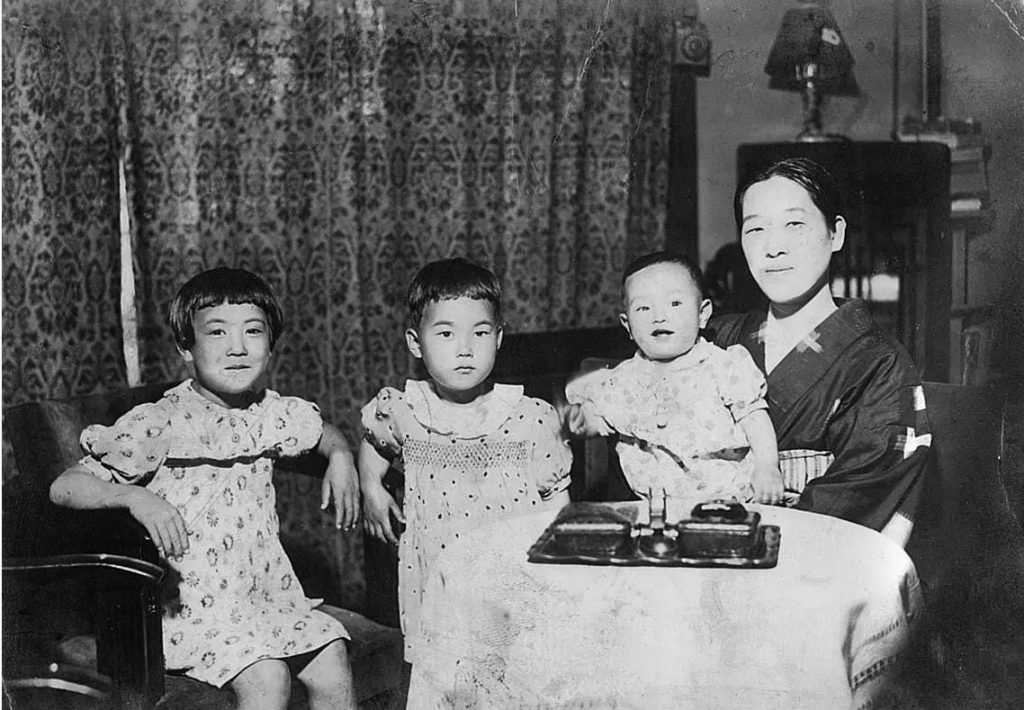
Mother with her children, Mieko on the left, Emiko in the middle and her little brother on the right.
My mum was kind to everyone. Not just with our immediate family, but with dad’s sisters and brothers, but her own as well; she took care of everybody. She was from Hatsukaichi city.
In the olden days, girls were brought up to sew, make tea and arrange flowers. Having those skills was what made you a woman. Mum taught sewing from our house. She took in all the girls. When I was little, I had too many family members to keep track of, so I didn’t know who was family and who wasn’t. In my mum’s words: “If I was by myself, I’d have to raise the kids and take care of the house. Because all of your ‘sisters’ come to help, I’m able to take care of you all.”
Lots of people told me how my mum had helped them or taken care of them. Like “Because your mum came, I stayed on the right path.” Even if they tried really hard and got a university education, there was no jobs for those from the buraku (effectively slums in which people who worked ‘dirty’ jobs like butchers and undertakers lived with their families; these people faced and still face deep discrimination today). “Just when I was about to join a gang, your mum reached out to me and saved me”. I think that because she’d lost children herself, she could treat them like her own.
I think discrimination is something that is taught, kids only know it because their parents impart it to them. When I went to my friend’s house, they made sukiyaki (beef hot pot) for us. Right after the war, there wasn’t any such thing as sukiyaki in most places. There was no meat to put in it. At my house, if there was vegetables and tofu to eat, that was a good night. Then my friend’s family gave me sukiyaki that was full of meat. When I got home, I’d tell my mum “It was sukiyaki, full of meat! It was sooooo good!” Mum had to have known my friend was from the buraku, but she didn’t tell me I couldn’t go visit or anything. Thinking back, I was never taught to discriminate against those from the buraku.
My older sister, Mieko
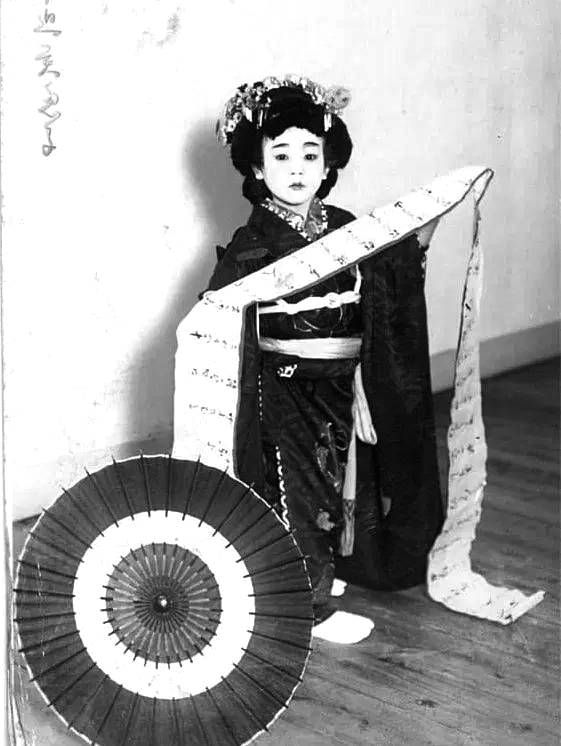
Mieko Nakasako, in traditional dress, performing buyo dance.
My sister was what a real leader, she pulled everyone into line and was called “Miss Class President”. At the time, the boys were the leaders, and the girls were below them. Before the war, co-ed schools weren’t a thing you see. My sister making it into the Daiichi Girls School was a point of pride for my parents. Only two girls were picked to get in from primary school. As the war got really intense, we weren’t able to get any of her graduation photos, nor her photos from when she started school there.
She was just a normal 12-year-old girl. Chatting with her friends in the curtains and stuff. I think she was a good sister. When I hear people who still have their sisters talking about them, I think about what life would have been like if she lived.
It’s complicated. After she died, everyone would say things. The neighbours would tell mum how my sister was smart and beautiful. I know they were likely meaning it in a sympathetic way, but listening from the other side of the wall, there were times that I felt sorry for myself. Like “Why was I the one to survive?” So I’d take it out on my parents. If they told me “get studying”, I’d just say “yeah yeah.” When my mum tried to teach me to sew, I’d just tell her “I’ll never sew, I’m never going to wear a kimono anyway.”
I’ve still got a letter my sister sent our cousin. When she was in her first year at Daiichi Girls School, she sent our cousin who was off to the front a letter, but it got returned to us. Apparently he hadn’t been sent off yet. It’s written on paper from the time. At the end, it’s signed “Hiroshima Prefectural Hiroshima Daiichi High School, Mieko Nakasako.” Would kids these days write something like that? This is the only thing of hers I have left. We didn’t find her bones or anything.
The sixth of August, 1945
My lost sister
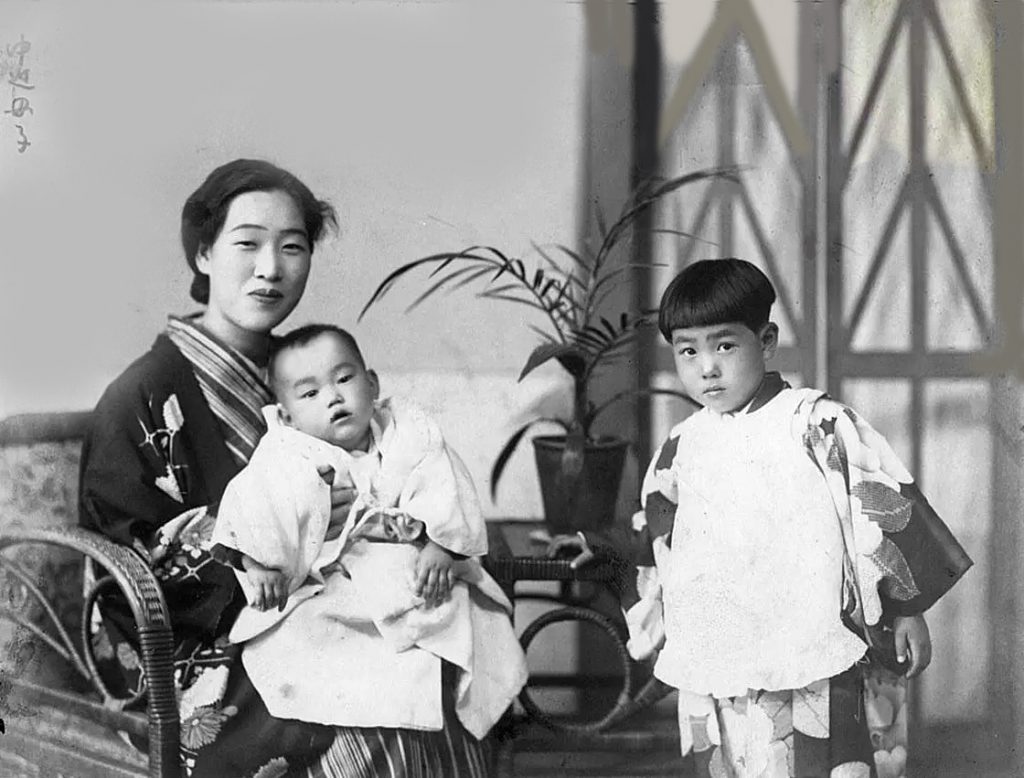
A baby Emiko in her mother’s arms, Mieko is pictured on the right. She was never seen again after leaving home for a school work group on the morning of August 6th, 1945.
I had been evacuated to the countryside in Hatsukaichi from Hiroshima. But my cousin’s red paper had come, so we all went to Hiroshima Station to see him off. During the two days I had been back home in Onaga, the atomic bomb was dropped. My mum and I ran away to the Eastern Parade Grounds. Dad was leading a group of students and working in Danbara at the time.
Before the war, I think I was just the daughter of a normal family. The bomb really changed not just my, but every single persons’ lives.
After the air raid sirens were cancelled, my 12-year-old sister was full of life when she called out “I’ll see you later!” and left for work. She still hasn’t come back. That’s why I’m always telling my story. Try and imagine. One of your family members, your brother, your sister, full of life telling you “I’ll see you later!”, then just never coming back.
Dobashi was where she was supposed to meet for work. I know that. After the bomb was dropped, nobody has any idea what she did or where she went. So now I think I’d be happy if it was a direct hit, an instant death. Without running around aimlessly in dreadful pain.
My parents searched as hard as they could for my sister. My mum was pregnant at the time, she miscarried. But still they kept saying that if we hadn’t found her body, she must be alive, somewhere.
Her name wasn’t put in the memorial cenotaph in the Peace Park. My parents were just so determined, searching for her. Thinking now, I don’t think a death certificate was ever even issued.
On the 50th anniversary of her death I inquired and knew for the first time. I told them, “Her name was Mieko Nakasako.” and they told me, “Her name’s not in there.” From 12 years after the war, it was made such that if a victim died, their name was automatically put in there. So that means that if her name isn’t in there, there was never any death certificate made. So that got me thinking, there’s got to be a lot of other people that just vanished like her. There were whole families just completely wiped out.
We never had a funeral for her. Hmm, maybe there was one about five years after the bombing. I can’t recall. I don’t think there was. We could never make anything like a grave, everyone just placed stones like Buddha statues, thought that they held the spirits of their kids, and left. Not even my sister’s bones were left. Thinking that it was their daughter, they just placed the stones. Inside and around temples. I just remember that when my mum saw a stone, she’d put her hands together and pray. That’s all she could do.
The whole city of Hiroshima was wiped out. They say that 70,000 people died straight away, but it’s not like anyone ever counted them. It’s all just estimates. There are seven rivers running through the city and everyone just jumped into them, they could have been washed out to sea. No-one knows how many people died in Hiroshima. With just a single nuclear bomb, not just people, but many forms of life, flowers, trees, animals, they were all wiped out.
In places like the Memorial Tower and the Peace Museum they keep their names and pictures forever, but of course you have to properly apply and supply photos in order to have it done.
More than 6300 kids who were out doing demolition work were killed, 12, 13-year-olds. My sister was one of them. It’s unforgivable, things that wipe out so many kids like that. Try and say it, just a 12-year-old girl, a grade six or seven girl. She couldn’t buy lots of clothes. She was forced into labour, demolishing buildings and such. Al the things they carried and wore at the time, the hats, the uniforms, the buttons, the belts, the buckles, the lunch boxes. All those things in the museum aren’t replicas. Those are all that remains of kids who were only 12-13 at the time. So when kids come on school trips I tell them to just take that in. I tell them, “They aren’t fakes. They’re the relics left behind by the children who died.”
I’ve been to a memorial service for those from the Daiichi Girls School. I saw an article saying that a former student, Ms. Shishido was holding a fiftieth anniversary memorial service in the Chugoku Shinbun. In my case, my parents had died a long time ago, and our address had changed anyway, so there was no way for them to contact me. So, I called Ms. Shishido on the phone. “I’m the little sister of one of the former students, can I still attend the service?”
Daiichi was really a very elite school. Everybody wished they could go there. So having gotten in, my sister was having a good time there, despite the war raging around her. It was a time where you really couldn’t get any sort of study done, but you could still be with friends, dress up, make bags out of old sashes and she was having fun going to school and doing that, the survivors I met told me.
At the service, I met two people who survived the bombing because they were home sick from school on the day. When I told them that I was Mieko’s little sister, some of the survivors went pale. One of them was from the same primary school as my sister and I, Onaga Higashi, their name was Takeda. They were really close with Mieko. On the day they were at home, sick. She’s living in Yokohama now, but came back to Hiroshima for the 50th anniversary.
Of course, I knew what my sister was up to because, well, she was my sister, but I always wondered what she was doing for schooling in the four months between actually getting into Daiichi and the bomb being dropped. I wanted to hear more about my sister, anything was fine, so I asked, “Can you tell me your story?” But, it seemed that she was feeling a great guilt for having survived. “I’m sorry…” she said, and shook her head. Even though we were from the same school and similar backgrounds, I felt bad afterwards for having asked.
So I never did get to hear those stories. I felt that, she had lived her whole life with a silent pain in her heart, constantly guilty for having lived. I felt sorry for her.
I hear that on that day, there were schools where they didn’t head to work and not a single person died. It was a real fine line. In that war. Life could be taken away in the most sudden possible moment. The students were just doing as the school had told them to. 12-13-year-olds, they didn’t deserve to have their lives taken.
I Hate Sunsets
A few times every year there are times where the sky is dyed a deep red at sunset. So red that even people on the ground’s faces are turned red. On those days, I can’t help but think of sunset on the day that the bomb was dropped. I hate sunsets. From where I was, it was blood red. For three days and three nights, the city burnt. Even now, 73 years later, I don’t want to think about that time. On the 6th of August, there was nothing I could do to help the people who were strewn, dying amongst the rubble; I left them and ran.
I still can’t forget the eyes of a little girl who clung on to my pants and begged, “Help me, help me…” I couldn’t help, but she was really imploring me. Kneeling in the rubble, begging for my help. Those eyes. I can never forget. I just had to leave her and run.
The evacuation points were the Primary School I was attending, and the school my dad was working at, but the buildings had been twisted out of shape. As if they had gone mad. They weren’t very strong buildings. You see, everything was made out of wood in those days. The buildings were enveloped in flames, it was as if the flames were crazy, chasing down the buildings. Lots of rubble had been blown underneath the building, and people were still strewn amongst it. The flames came down and many people were killed there. I left and ran away to Yamate. After that, a strong wind came, I checked afterwards and it seems that the direction of the wind changed, but I had to leave many still living people behind there, there was just nothing that I could do.
I didn’t know what time I had. I can’t recall at what time the fire started, but the flames came chasing, I can never forget that I had to leave many still living people behind.
A student from Motomachi High School drew me a picture of my experience afterwards from my story. Even if I tell my story, 15-year-old kids these days have no experience of crazy flames chasing them or hell-like fires starting, so it’s hard for them to understand. Even so, they tried their hardest to draw it for me.
People really have no idea how suddenly things can happen. It was a very fine line (between survival and death). The direction of the wind changed (points at the map), and so the flames stopped here. If it didn’t change, then I would have been caught in the flames. All the survivors around moved as one and evacuated to the Eastern Parade Grounds, where the military trained. Everyone was burnt. Fires kept popping up everywhere, to get away, you simply had to go through them. Amongst all of this, there were kids that had gotten lost. I can still hear them calling out, “Mum, Mum, Mum, Mum”. Everyone else from my primary school had been evacuated to the countryside, so I was pretty much the only one to be hit by the bomb. A few other kids from my neighbourhood were also hit though.
No matter when, it always ends up being innocent children that are hurt most. I was only eight at the time. My sister had hopes and dreams for middle school. At the time, getting into middle school was a special thing. But after she got in, she hadn’t spent a single day studying. Every single day, she was out working, demolishing buildings for her country, for her family. A 12, 13-year-old child.
I recently studied at the temple in Onaga with 10 people who had applied from all over the country. Starting from Nigitsu Shrine behind where the Eastern Parade Grounds were located, we went around on a tour to seven temples and shrines. One of those, Onaga Tenmangu, is where the god of study resides, so kids would have their written wishes hung there for luck. When we were kids, we used to go there often, on New Year’s and such. I had mine hung there too.
Walking there again, I thought back, I remember this place. Until I visited, I had completely forgotten it existed. When I evacuated, the temple that had looked after me so well when I was young, going back again brought it all back. “Over where this bathroom is, lots of people died.” Things like that. Everybody wanted water. The lanterns and lion statues around the temple grounds were all charred too. The colour on the outside was different, but it’s still all there. The buildings are on a slant, the tiles had mostly been replaced, but there were still some that were there at the time. Pillars with bits of glass sticking into them and such.
The Eastern Parade Grounds were full of corpses. Everyone was facing up, trying to evacuate to higher and higher places. At the time, there were hundreds, thousands of dead people, that we just left behind, we had no way to do anything. Even so, I believe the temple made offerings to try and help their souls. There were so many unidentifiable people, people that couldn’t make it home. The majority of soldiers still had their uniforms, but normal people and children really had nothing left. I’m thankful for the monks at the temple, because we really couldn’t do anything. Everyone was too focused on getting away, as fast as possible.
In my immediate family, I lost my sister, and in total, I lost five relatives. My dad’s little sister was one. Apparently, she was part of the teishin-tai (The Women’s Voluntary Work Corps). All I know is that she evacuated from Jogakuin to Sentei (presently known as Shukkeien). Her friends were together with her, but at Sentei they got split up and don’t know what happened afterwards. Nobody knows which direction she evacuated to after that. My aunt was living right in front of the Matobacho tram stop at the time. Under the ground there, they found three skeletons, so we know that people died there. We know people died there because we found their bones, but like my sister, we have no idea what happened after they gathered.
Even so, I still had my parents. They were desperately searching for my sister. So it’s not like I was spoilt. Nobody had a taste of ‘normal family life’ for more than five years after the war. Even more so the kids that were orphaned, they really had to fend for themselves.
My hair was falling out, I was bleeding from my gums. I was constantly exhausted, and always had to lie down. I was told it was ‘flash sickness’. Because nobody at the time had any idea what radiation was. Afterwards, I was diagnosed with aplastic anaemia.
The other day, I had cataracts surgery, but as I thought, the recovery is slow. I get so tired.
English Translation by Liam Walsh
Part two is available now here: http://antnews.hiroshima-nagasaki.net/emiko-okada-the-story-of-an-atomic-bombing-survivor-part-two/ please take a look.
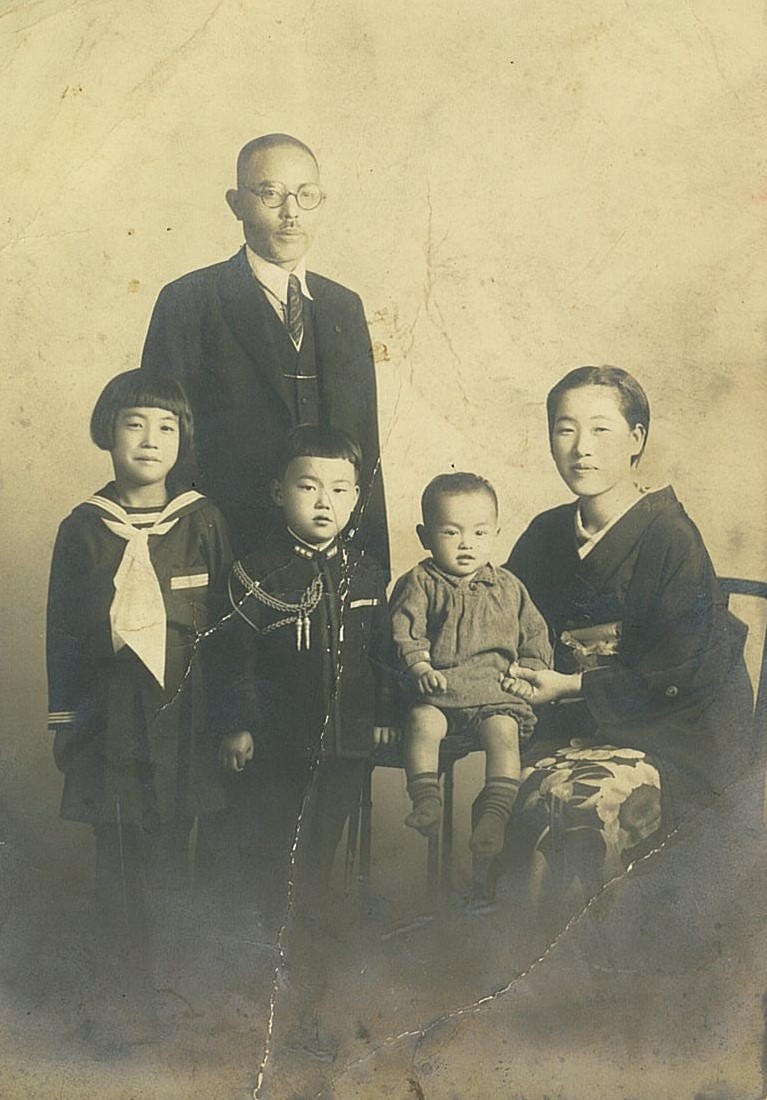


There is nothing scary than war. And I desperately don’t know when it will end.
It was really heart touching story. Love and sympathy from Afghanistan Okada san. <3